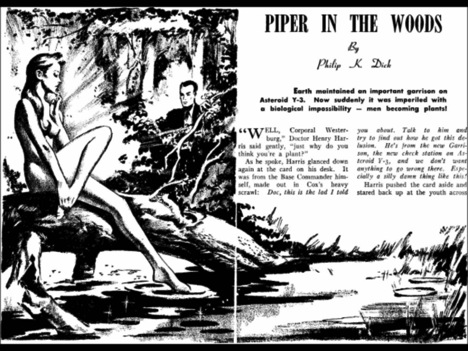Last time, we took the long trip from Earth to Mars and back again with Captain Franco and his crew of Earthmen, who faced the philosophical conundrum of killing and eating an intelligent alien life form in order to ensure their daily meals on the way home. Dick’s satirical condemnation of colonialism and the objectification of native culture made this a clever but also surprisingly funny read.
This time, Dick takes us once again into space to examine humanity’s interactions with the “natives” of far off worlds, but this time, the threat isn’t a ship full of hungry Earthmen. In Piper in the Woods, we’re already in the midst of being crushed by the enemy: the monotony of human existence.
Piper in the Woods starts on an Earth garrison, when Corporal Westerburg pays a visit to Doctor Henry Harris. Westerburg has just returned from Asteroid Y-3, where he is stationed as a Patrolman. Westerburg has dedicated his life toward the pursuit of this job, and he finally has it… but the only thing is, he doesn’t want to be a Patrolman anymore. In fact, he claims that he isn’t a person at all anymore. The reason for his visit, in fact, is so that his employers can glean the true meaning behind the bizarre claims he’s been making. Westerburg claims that he has become a plant.
This starts as an isolated incident, and Harris believes that Westerburg feels overwhelmed by his duties, and is trying to get out of his responsibilities. The doctor’s theory, however, seems unlikely when many, many more soldiers on Y-3 begin to claim that they have become plants. They admit that they haven’t changed physiologically, but that “it is possible for a warm-blooded animal, an upper primate, to adopt the psychology of a plant, to some extent.” And that is exactly what these folks have done.
Believing there to be a scientific cause to this strange effect, Harris head to Asteroid Y-3 to investigate one soldier’s claims, under hypnosis, that they were “taught” how to be plants by “the Pipers.” Harris discovers that the asteroid’s natives are peaceful – plantlike – and lack a structured society based on hard work and merit, and instead find the idea of a “job” to be as ridiculous as Harris finds the idea of a man becoming a plant… until he sees exactly how peaceful this plant-like existence is.
Dick’s deceptively simple, dialogue-driven narrative once again deconstructs “Earthmen” culture, but the target this time is something far more ingrained in far many of us us than colonialism. Humanity as a whole is obsessed with hard work – I mean, the idea of the endless pursuit of happiness (or money; or love; or any other fill-in-the-blank replacement for true personal contentment) hangs over all of us like a pendulum. How many of us live in the moment? Compared to those who plan, who spent the present planning for a future that will one day become a present that we ignore, there’s no comparison. As a race, humans want something better, quicker, more gratifying. And that’s by no means insidious… but is it hard? I think so. Is it crippling? Maybe.
In Piper in the Woods, Philip K. Dick asks us a seemingly ridiculous question that, like Harris, the reader begins to take more and more seriously as the story builds toward its conclusion:
What if we just became plants?
Piper in the Woods, originally published in Imagination, can be found in many of Philip K. Dick’s short story collections, including: The Collected Stories of Philip K. Dick and Paycheck and Other Classic Stories, originally published as Beyond Lies the Wub collection.
PAT SHAND writes comics (Robyn Hood, Hellchild, Grimm Fairy Tales), novels (Charmed for HarperCollins), and pop culture journalism (Sad Girls Guide, Blastoff Comics). He lives in fast-paced New York, where the prospect of becoming a plant seems all too inviting.


Comments are closed.